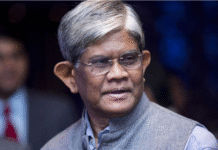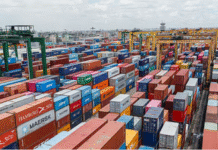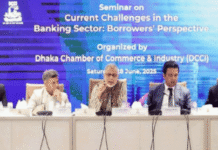
During the 2014 parliamentary election, Bangladesh’s economy suffered greatly following 55 days of countrywide strikes and blockades since July of 2013 to January of 2014
Considering the prevailing political situation of the country, the upcoming 11th general election to be held on December 23 is unlikely to have any adverse impact on Bangladesh’s economy, said businessmen and economists.
However, they opined that private sector investment may remain stagnant until a new government is formed.
The Federation of Bangladesh Chambers of Commerce and Industry (FBCCI) President Md Shafiul Islam Mohiuddin said: “With policy support from the government, and political stability, the country will continue to progress. The economic landscape of 2019 and beyond will depend on the stability of the country, during the 11th general polls.”
He said apparently the business activities will go as usual, but long-term investment will go through a wait and see regime until the ensuing elections and aftermath.
Drawing confidence from the on-going dialogues between the government and other political parties, Dhaka Chamber of Commerce and Industry (DCCI) President Abul Kasem Khan told the Dhaka Tribune that the nation’s politics reaching such a mature stage is a good sign for the economy.
“In previous elections, we did not see any cooperation or negotiations among political parties,” said the DCCI president, adding that these dialogues are giving the business community more confidence.
He further added: “Political parties should think about the country’s economy as we have a growing market and solid investment base from home and abroad.”
During the 2014 parliamentary election, Bangladesh’s economy suffered greatly following 55 days of countrywide strikes and blockades since July of 2013 to January of 2014.
According to data by the Centre for Policy Dialogue (CPD), Bangladesh economy has witnessed financial losses of about Tk49,000 crore during the period.
World Bank’s “Bangladesh Development Update Report published in 2015” claimed that the country lost $2.2 billion or 1% of the country’s total gross domestic product (GDP) due to prolonged political turmoil.
Speaking to the Dhaka Tribune, BGMEA Senior Vice President Faruque Hassan said that the business community is very positive that the election will be held peacefully, and there will be no incident which will hurt the economy.
“Political instability and violence hurts our export industry very badly, so we want a peaceful election to prevent losing buyers’ confidence on Bangladesh,” said Faruque, adding that the business community had already assured buyers of a peaceful election that will not hamper business.
A DCCI survey found that earlier in 2014, Bangladesh’s $30 billion RMG industry suffered financial losses worth Tk842.5 crore due to political unrest.
Moreover, the transport sector lost Tk300 crore daily. The agricultural sector lost Tk288 crore in, real estate sector Tk250 crore, and tourism sector Tk210 crore. The wholesale and retail markets suffered losses of Tk150 crore, while the manufacturing sector lost Tk100 crore.
“A stable political situation is very important for an economy. Compared to the previous years’ instability during or ahead of elections, there is a peaceful situation in the county so far. I hope, it will remain stable,” said Zahid Hussain, lead economist of World Bank Dhaka.
“Disruptions in business environment that happen due to strikes, demonstrations, and blockades, is absent now,” said Zahid, adding that if the prevailing situation continues, there will be no negative impact to the country’s economy.
Selim Raihan, Executive Director of South Asian Network on Economic Modeling (SANEM) said: “As of now, the political situation indicates that the next election will be held peacefully. The situation is better compared to the previous election. So, there will be no big impact on the country’s economy.”
Businessmen want proper elections and continuity of stability
While business leaders welcomed the current political stability, they also want a fair election to ensure participation of all parties.
“In the past, due to destructive political activities, businesses would suffer from huge financial losses,” said Asif Ibrahim, former president of DCCI. “Fortunately, it did not happen before this election. We welcome this positive change.”
“Bangladesh is progressing towards economic development and the politics of the country has also showed positive attitude toward economy, which is to be expected,” said Asif, also Managing Director of NewAge Group.
Private investment to go slow
Private sector investment, particularly the long-terms investment, is likely to slow down due to anxiety among business people and fear of instability from the previous experience,.
“Though the situation is calm but there is some apprehension among business people as they suffered losses in previous elections,” said Selim Raihan, also a professor of Economics at Dhaka University.
“So, ahead of parliamentary election, new investments from private sectors may go through stagnant situation as the entrepreneurs are observing the pre-election and post-election situation.”
Selim added that in the last few months imports, especially raw materials and capital machinery, saw adeclining trend, due to investors’ being cautious in making investment decisions, ahead of elections.
Source: Dhaka Tribune.









